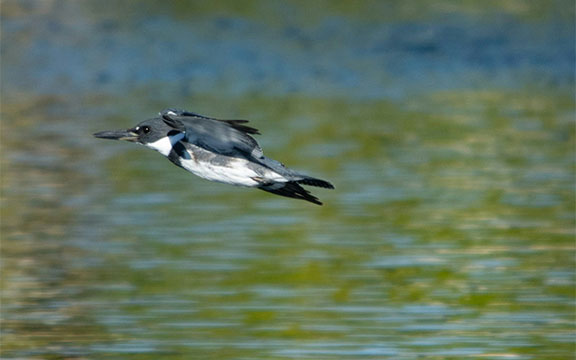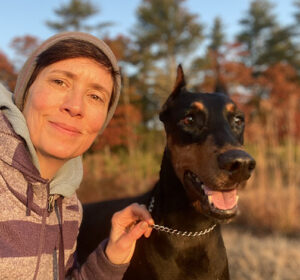
Photo by Erik McLean via Pexels.
Huddled inside my heaviest winter coat at the edge of a pond, I watched as my coffee steam merged with misty clouds of my breath. At dawn the cranberry bog in coastal Massachusetts was an expanse of frozen sand and wiry tangles of russet vines; old snow scudded across the fields and collected in thin drifts at the pond’s edge. My dog, Zoë, a diminutive yet feisty Doberman Pinscher, ran sprints on the frozen path.
I still felt the inner warmth of my morning meditation. But I also felt wiped-out; a result of yesterday’s out-of-nowhere emotional meltdown. My morning sadhana, Yoga practice, had helped. But still exhausted and unsettled; I took my doubts on a walk.
The meltdown had happened in the midst of a movie date with my husband. At first the noise was too jangly; then the popcorn chomping rattled; the rumble from the action-flick in the adjoining theatre disrupted; and when the battle scene of our period drama commenced, the clashing cut me down. All my usual tricks—Yogini! Heal thyself!—did not work. Not deep breaths, not shutting my eyes, not my mantra, not relaxing my body, not riding the wave. I fled to the fluorescent cavern of the bathroom, locked myself in a stall, and sobbed. One thought repeated: does anything I do really matter, anyway.
So the January morning was exactly what I wanted. Solitude, cold, dark; but a place where the light would return. When the glaciers receded from this land ten-thousand years ago they left kettle holes filled with rocks and organic matter which North American cranberries, Vaccinium macrocarpon, loved.
From our little speck of gravel pathway Zoë and I stood on just a portion of the 197 million square miles of the earth’s surface. Scattered across this surface were eight billion people; at that moment some were praying; others dancing; some being born; some exhaling their final breath; wars burned; people argued. Maybe this is the source of my overwhelm, a classic early twenty-first century angst of feeling unseen among the billions of other souls. But I knew this wasn’t quite the heart of my overwhelm.
A clattering like a wooden ratchet rattled the silence apart. “Kingfisher!” I said, telling Zoë, who had stopped her sprints to stare out over the pond. In the grey light I could just make out his wedge-like head and purposeful flight. If not for his call surely I would have missed him. The Belted Kingfisher is not the kind of bird that many notice, even if it flies directly overhead. It’s not as common as a sparrow or grackle; as iconic as a Bald Eagle; nor as noticeable as a Great Blue Heron wading in the shallows.

Photo by Jessica Kirkpatrick via Unsplash.
The Belted Kingfisher, no bigger than a robin, darted across the pond with a flash of white belly and wings. He landed on the pump house and his shaggy crest unfurled like a banner. I sipped my coffee and tasted cherries and cinnamon. Zoë nudged my hand let’s walk! But I kept still, my eyes trained on the bird. Quick as an arrow he dove and drove his spear-like beak into the water. As he flew back to the pump house I strained to see if he had caught a fish. But then he was off again; this time hovering over the pond before diving. Zoë nudged my hand again, this time so hard some of my coffee dribbled down my coat. All right, all right, I told her, and together we strode up a hill.
Animals that show up on my question walks always provide insight; a novel approach to the problem, a quirk of their nature that gives a clue to what I’m overlooking, or a characteristic I need to mirror. Crunching up the frozen gravel my mind flipped through the facts of Belted Kingfishers, checking for correlations between their habits and my overwhelm. Zoë crested the ridge before me and trotted off into the brush at the edge of the dark woods. The bird made another rattling call which tumbled up the hill.
I ticked each fact off mentally: they hunt solo, eat fish, and live at water’s edge; they burrow holes up to six feet into creek banks in order to nest; the male sometimes making his own separate burrow a bit away from the nest so he can eat and rest; they are territorial and defend their nesting and fishing spots which can be as long as over half a mile; they are known for their swift aerial dives; they are self-contained and feisty.
I finally crested the hill and turned toward the pond. The first glimmer of sun rose above the trees. Come on, I thought, little mighty Kingfisher, what do you have to teach me about overcoming this feeling of insignificance?
The sun clawed its way upward as the bird kept calling and fishing. I finished the last—now cold— sips of coffee. Zoë returned from the brush with a blue tennis ball that she pilfered from a dog who had left it behind. We explored the hilltop until my cheeks ached with the cold. Finally the sun reached us. I crouched down and put my arm around Zoë; she licked my ear before raising her snout toward the sun. The Kingfisher completed his hunt and flew away with a final rattle. His call fell on the bog like scattered pebbles. We watched him until he disappeared beyond the trees. For a moment I felt pity for him. There was no one to witness his expertise in fishing, no one to hear his calls, no one to notice his strength. But I had been there to see him, so had Zoë.
I had the grace of a morning Integral Yoga sadhana-practice-to get me up before dawn to meditate and do Hatha Yoga. I had the gift of suffering which nudged me out into the cold morning looking for answers. And showing up on the path of spiritual practice had brought me the grace of watching a fellow—albeit winged—seeker perform his morning ritual.
It occurred to me that though small, he does matter. He is the water he dives into; the hillside where he tunnels his home; the morning air he calls into; for he is the full tapestry of existence. I felt reminded that my suffering is not something to overcome in favor of a—seemingly—more enlightened view. Zoë and I headed down the hill and walked the path back home.
There is a saying in Integral Yoga coined by its founder, Swami Satchidananda: “Truth is One, paths are many.” Formal practice is my touchstone but my path always leads to walks in nature. In these moments of alive stillness, the grasping fist of my mind opens and reveals a small experience of an expanded presence.
There was no flash of insight from the Belted Kingfisher. No triumphant easing of my meltdown recovery. But there was a quiet pause that allowed me to feel my human wounds as part of inherent wholeness; a release of the illusion that pain and happiness are two separate things. The frozen earth and open pond. The rattling cry turned still. Grey wings against the rising sun. All embraced my human longing as part of the warm divinity of a winter morning.
About the Author:
 Gita Brown is a wellness activist, musician, and writer. She is a certified Advanced Integral Yoga® teacher and licensed Yoga for the Special Child® practitioner. Through her “Yoga with Gita courses” and podcast, “The Gita Brown Show,” her mission is to teach her students how to adapt the traditional practices of Yoga to bring more ease, wellness, and joy into everyday life. Gita started Yoga as a teenager, when her love of Yoga grew in tandem with her career as a classical clarinetist and music therapist. For three decades, she has taught Yoga, wellness, and music courses at colleges, schools of music, community schools, private studios, public schools, and hospitals. She offers Yoga to students of all ages and abilities through online programs and in person at her home studio at Three Dog Farm in Kingston, Massachusetts. Learn more about her services by visiting: https://www.gitabrown.com
Gita Brown is a wellness activist, musician, and writer. She is a certified Advanced Integral Yoga® teacher and licensed Yoga for the Special Child® practitioner. Through her “Yoga with Gita courses” and podcast, “The Gita Brown Show,” her mission is to teach her students how to adapt the traditional practices of Yoga to bring more ease, wellness, and joy into everyday life. Gita started Yoga as a teenager, when her love of Yoga grew in tandem with her career as a classical clarinetist and music therapist. For three decades, she has taught Yoga, wellness, and music courses at colleges, schools of music, community schools, private studios, public schools, and hospitals. She offers Yoga to students of all ages and abilities through online programs and in person at her home studio at Three Dog Farm in Kingston, Massachusetts. Learn more about her services by visiting: https://www.gitabrown.com

